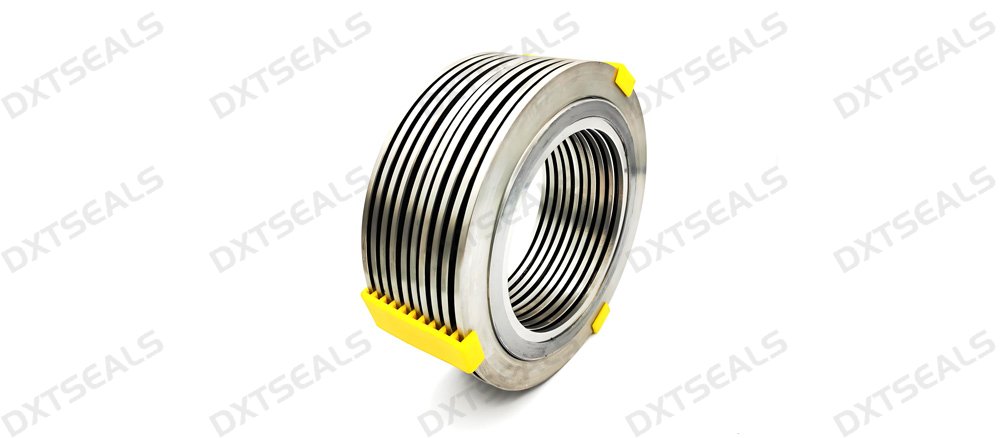Introduction
Flange gaskets are essential components used to create a seal between two flanged surfaces, preventing leaks of gases, liquids, and other substances. Whether you’re working in chemical processing, oil and gas, food production, or HVAC systems, choosing the right flange gasket is crucial for maintaining the efficiency, safety, and durability of your systems. Flange gaskets come in two main categories: metal and non-metallic. In this guide, we’ll explore the differences between these two types, their benefits, and the applications where they excel.
1. What Are Flange Gaskets?
A flange gasket is a sealing material placed between the flanged connection of two parts to prevent leakage and ensure a tight seal. These gaskets compensate for the imperfections of mating surfaces, preventing fluid, gas, or pressure from escaping. The choice of gasket material depends on the operating conditions, including temperature, pressure, chemical exposure, and the nature of the fluids being sealed.
Key Functions of Flange Gaskets:
- Leak Prevention: Prevents leakage of gases or liquids from flanged connections.
- Pressure Resistance: Ensures the system remains sealed even under high pressure.
- Chemical Resistance: Protects against corrosion caused by aggressive chemicals.
- Thermal Insulation: Some gaskets also act as thermal barriers, reducing heat transfer.
2. Metal Flange Gaskets
Metal gaskets are made from various types of metals and alloys, offering durability and performance under extreme conditions, such as high temperature, high pressure, and chemical exposure. They are ideal for applications that require robust sealing capabilities in harsh environments.
Types of Metal Flange Gaskets:
- Spiral Wound Gaskets: Made from metal strips and filler material wound into a spiral shape. These are highly effective in sealing under high-pressure conditions.
- Ring Type Joints (RTJ): Designed for high-pressure and high-temperature applications, often used in oil & gas pipelines and refineries.
- Corrugated Metal Gaskets: Featuring a corrugated metal core with a soft sealing material applied, these gaskets provide excellent sealing performance in fluctuating temperatures and pressures.
Benefits of Metal Flange Gaskets:
- High Temperature and Pressure Resistance: Metal gaskets can withstand extreme temperatures and pressures without losing sealing integrity.
- Durability: They offer a long lifespan, even in challenging conditions, reducing the need for frequent maintenance.
- Chemical Resistance: Certain metals, such as stainless steel, offer excellent resistance to corrosion and chemicals.
- High-Performance Seals: Ideal for oil & gas, chemical processing, and power generation industries, where leakage prevention is critical.
Applications of Metal Flange Gaskets:
- Oil and gas pipelines
- Chemical reactors and processing units
- Steam and water systems
- Petrochemical refineries
- Power plants
3. Non-Metallic Flange Gaskets
Non-metallic flange gaskets are made from a range of materials, including rubber, graphite, PTFE, and cork. These gaskets are generally more flexible and are suited for sealing applications that don’t require the high-pressure tolerance of metal gaskets. Non-metallic gaskets are versatile and are commonly used in less extreme conditions.
Types of Non-Metallic Flange Gaskets:
- Rubber Gaskets: Made from various elastomers, such as NBR, EPDM, and Viton, these gaskets are ideal for sealing in systems with moderate temperatures and pressures.
- Graphite Gaskets: Graphite is known for its excellent thermal stability and resistance to high-temperature environments. It can be used in applications up to 900°C (1652°F).
- PTFE Gaskets: Known for their non-stick and non-reactive properties, PTFE gaskets are used in environments where chemical resistance is crucial. They can handle temperatures up to 260°C (500°F).
- Cork Gaskets: These gaskets are used for sealing low-pressure systems, offering good compressibility and resilience.
Benefits of Non-Metallic Flange Gaskets:
- Cost-Effective: Non-metallic gaskets are often more affordable compared to metal gaskets.
- Flexibility and Compressibility: They adapt well to irregular surfaces, ensuring a tight seal even in imperfect flanged connections.
- Chemical Resistance: Materials like PTFE and rubber are highly resistant to chemicals and harsh substances.
- Lightweight: Non-metallic gaskets are typically lighter than their metal counterparts, making them easier to handle and install.
Applications of Non-Metallic Flange Gaskets:
- Water treatment systems
- Food and beverage processing
- Pharmaceutical and medical equipment
- HVAC systems
- Low to medium-pressure applications
4. How to Choose the Right Flange Gasket for Your Application
Choosing between metal and non-metallic flange gaskets depends on several factors related to the specific conditions of your system:
Considerations When Choosing a Flange Gasket:
- Temperature Resistance: If your system operates at high temperatures, consider metal gaskets (e.g., spiral wound or ring-type joints) or graphite gaskets.
- Pressure Levels: For systems under high pressure, metal gaskets are typically the best choice. If the pressure is lower, non-metallic gaskets may suffice.
- Chemical Exposure: If the system handles harsh chemicals, PTFE or graphite gaskets provide excellent resistance.
- Flexibility and Compression: Non-metallic gaskets, like rubber and cork, are ideal for systems that require flexibility and compression to conform to uneven surfaces.
- Cost Considerations: Non-metallic gaskets are usually more affordable than metal ones, but the specific needs of the system should dictate the material choice.
5. Conclusion
Flange gaskets are integral to sealing systems across industries, ensuring that leaks are prevented and systems operate efficiently. Whether you choose metal or non-metallic flange gaskets, the key is understanding the requirements of your system, including temperature, pressure, chemical exposure, and material compatibility. By selecting the right gasket material, you can enhance the performance, safety, and longevity of your industrial systems.
Metal gaskets are ideal for high-temperature, high-pressure, and chemically demanding environments, while non-metallic gaskets are best for sealing in moderate conditions with flexibility and cost-effectiveness. Always assess the specific needs of your application before making a selection.

